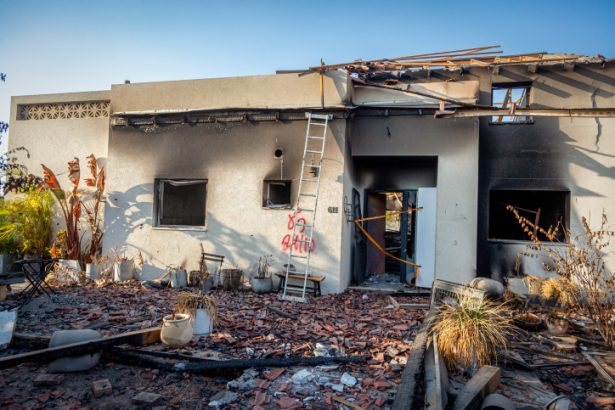If you think the largest mass murder of Jews since the Holocaust, perpetrated by the genocidal Islamists controlling Gaza (after Israel withdrew), will convince Israelis they should now withdraw from the West Bank too, you’re living in a fantasy, writes Paul Gross
Alongside welcome statements of support for Israel, you will hear from President Biden and other world leaders, statements of intent; stressing the urgency of reaching a two-state solution after this war is concluded.
Some management of expectations is called for.
My dear friends, I have news for you. If you think the largest mass murder of Jews since the Holocaust, perpetrated by the genocidal Islamists controlling Gaza (after Israel withdrew), will convince Israelis they should now withdraw from the West Bank too, you’re living in a fantasy.
This doesn’t mean Israel shouldn’t rein in settlement-expansion, or block the outrageous retroactive legalisation of illegal (under Israeli law) outposts. On the contrary, it would be a smart move by Israel to decouple the policy of civilian settlement from the necessity of military presence. (As Einat Wilf and Shany Mor advocated back in 2017: ‘Military-yes, Settlements-no’.) But I am fairly certain that, post-October 7, you will find an overwhelming majority of Israelis opposed to pulling the IDF out of the West Bank, and that includes the 50-60 per cent of Israelis who see a two-state-solution as the best option in the long-run. They understand that, were it not for the presence of the IDF in the West Bank, the PA would have fallen to Hamas or other Iranian-sponsored terror groups by now. For much of the old Israeli left that has moved to the centre, the desire to see an end to Israeli rule over the Palestinians is overridden by the now-easily-imaginable fear of an ISIS-style terror state on our eastern border.
This does not mean that Israel is giving up, that ‘there will never be peace.’ But it means that those anxious for a renewed two-state push will have to lower their expectations significantly. They are desperate to see a new Israeli government, when Benjamin Netanyahu will finally be out of the picture. But again, a reality check is called for. When Bibi finally departs the scene (and I for one hope it’s sooner rather than later), he will not be replaced as Prime Minister by the leader of the Labor Party.
The more-than-half the country who opposed this far-right government’s judicial reforms, have now been joined by arguably another twenty to thirty per cent of the electorate who blame Netanyahu and his ministers for the security catastrophe on 7 October. That means the next government is likely to feature neither Bibi, nor the most polarising and extreme political parties in the coalition. But it won’t be a left – or even center-left – government. It will most likely include a chastened, Bibi-less Likud (hopefully with its illiberal elements such as Justice Minister Yariv Levin politically weakened), alongside centrist parties National Unity and Yesh Atid. Those two latter parties will prevent a return to the assault on Israeli democracy, and will not support rampant settlement-building in the West Bank, but they will not be chomping at the bit to restart negotiations with Mahmoud Abbas.
What we will hopefully see with such a government, is serious steps towards Israeli-Saudi normalisation, and the possibility of blossoming relations with other Muslim nations in its wake. In the best case scenario, this will both tie the hands of Israel’s settlement-inclined right, and push the Palestinian leadership towards genuine acceptance that Israel, as the nation-state of the Jewish people, is here to stay. And that would remove the single greatest conceptual obstacle to peace.
That’s the necessary first step. A Palestinian administration that is willing and able to actually prepare its population for peace. To tell them through its official media, and to teach their children in their schools, that there are two peoples indigenous to this land, and we will have to share it; that there will be two states for two peoples between the river and the sea.
I recently contributed to a new website providing facts for people confronting the constant misinformation from the anti-Israel side. Entitled ‘Self-inflicted Statelessness’, I detailed eight different moments in history when the Palestinians or/and the Arab world had an opportunity to establish an independent Palestinian state, and rejected that opportunity.
Palestinian rejectionism has become such a hoary trope, that most Israelis and pro-Israel advocates abroad just shrug at it. But far, far too many people outside Israel either don’t know – or don’t want to believe – the facts. It’s not that Israel hasn’t made stupid mistakes (just how stupid we’ll hopefully find out when there’s a commission of inquiry after this war), and I’m the very last person to defend the venal, illiberal government we’ve been saddled with this past year, but the fact remains that there have been Israeli governments willing to make serious territorial concessions in order to reach an end-of-conflict, finality-of-claims deal with the Palestinians. And there has never been a partner on the other side willing and/or able to say yes.
Israelis by and large do not share the popular view (in the West) that the PA is ‘moderate’, except when compared with Hamas of course. (Though, after 7 October, the Khmer Rouge might be considered ‘moderate’ compared to Hamas). Israelis remember the ‘moderate’ PA President Mahmoud Abbas lying about Israel’s intentions to ‘desecrate’ the Al-Aqsa Mosque, inciting the so-called ‘stabbing intifada’; we’ve heard him claim – just a couple of months ago – that the Holocaust was a result of the Jews’ moneylending, remarks that US Ambassador to the UN Linda Thomas-Greenfield termed ‘hateful and antisemitic.’ Former US Ambassador to Israel, Martin Indyk, himself Jewish, and a long-time advocate of Abbas’s ‘moderate’ credentials, tweeted in response: ‘I have been despairing about how to respond to Abu Mazen’s profoundly anti-Semitic diatribe. How could someone who has treated me as a personal friend for three decades at the same time harbor such hateful views of my people?’
And of course we in Israel have been struck by the deafening silence of Abbas’s reaction to 7 October. No remorse or condemnation of Hamas – or of the celebrating Palestinians in the West Bank. The official PA website recently spread the sickening lie that the fatalities at the music festival were caused by Israeli helicopters; and just today, a senior Palestinian official in Abbas’s Fatah Party justified the horrors committed by Hamas that day.
To those in the US, the EU and elsewhere who are anxious to see a two-state solution come to fruition I say this: you are going to have to be patient. You are going to have to be willing to support incremental steps, over a long period, and to insist to your Palestinian interlocutors that their state can only come about alongside a Jewish state, not instead of it.
British foreign secretary Ernest Bevin, no fan of the Zionist movement, described the essence of the Jewish-Arab conflict in Palestine in this way: ‘For the Jews, the essential point of principle is the creation of a sovereign Jewish state. For the Arabs, the essential point of principle is to resist to the last the establishment of Jewish sovereignty in any part of Palestine.’
That has remained the case for 75 years. Real peace will be imaginable only when, at long last, the Palestinian leadership’s greatest wish is the creation of Palestine, not the destruction of Israel.





































